Apply now to join our next cohort of Community Science Fellows and Community Leads!
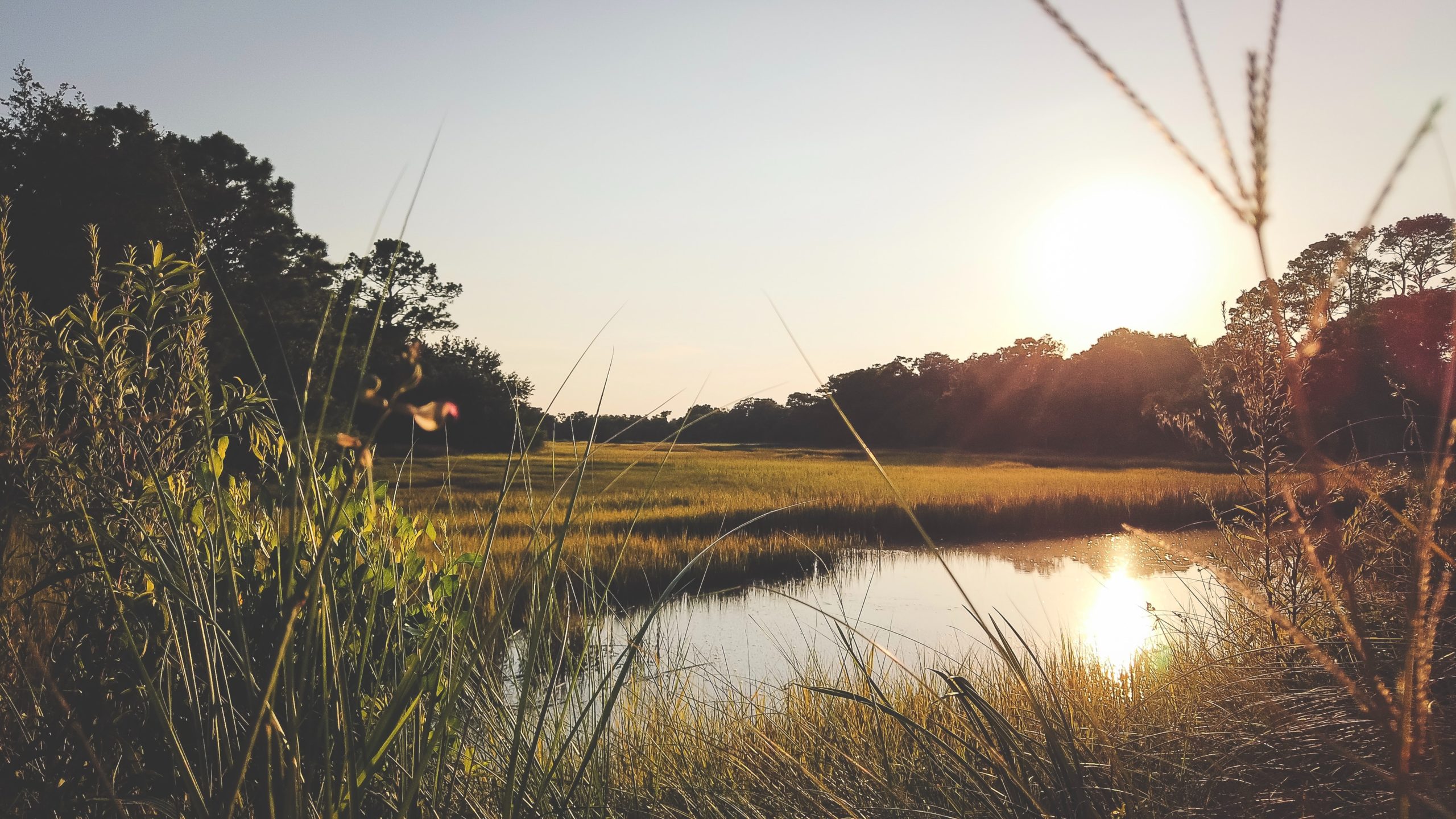
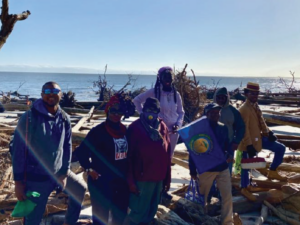
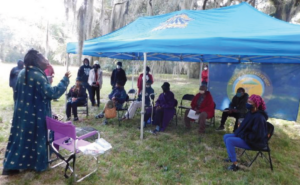
St. Helena Island in Beaufort County, SC is a rural Sea Island with a predominantly Gullah/Geechee population that is still reliant upon the waters that surround the island for subsistence. The Gullah/Geechee people are a unique national ethnic group that lives along the Intercoastal Waterway of the southeast. There are approximately 1 million people of Gullah/Geechee ancestry located between Jacksonville, NC and Jacksonville, FL on the Sea Island chain and within what is referred to as the “Carolina Lowcountry.” St. Helena Island, SC which is one of the largest Sea Islands, has one of the largest contiguous Gullah/Geechee communities that still practice the traditions of their ancestors. Approximately 10,000 people inhabit St. Helena Island off the coast of Beaufort, SC. The island is considered by many to be the epicenter of Gullah/Geechee life both historically and in the present day. St. Helena Island has a Cultural Protection Overlay (CPO) District that is part of the zoning plan for Beaufort County. The CPO was put in place specifically to protect Gullah/Geechee culture.
The isolation of the Sea Islands, which continued until the early 20th century, allowed Gullah/Geechee descendants to maintain many of their African traditions. It also allowed this group to develop as a distinct
community with its own language and culture (US NPS 2011). For more than a century, the Gullah/Geechee have lived in balance and harmony with the land and waterways as a natural continuum of their African and indigenous American traditions passed down by their ancestors. That balance has been disrupted, however, as urban sprawl spreads across the region, consuming natural habitats, intensifying land uses, and proliferating impervious surfaces that increase stormwater runoff.
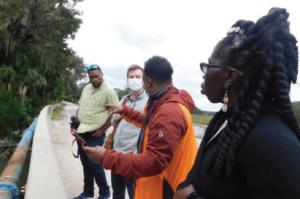
Ascertaining the water quality in our communities is an urgent priority. Many Gullah/Geechee households
depend on fish, shellfish, and other coastal resources for their livelihoods, through small-scale commercial
endeavors and through direct consumption of these resources (Ellis, 2013). Research suggests that rates of
Gullah/Geechee local fish consumption potentially expose this segment of the population to higher levels of the neurotoxin methylmercury (MeHg) (Kamen et al. 2012, Ellis, 2013, Ellis et al. 2014). This project provided Gullah/Geechee people with essential information to avoid exposure to harmful toxins, capture the local environmental knowledge of the Gullah/Geechee people, and ensure the continuity of their sustainable livelihood practices.
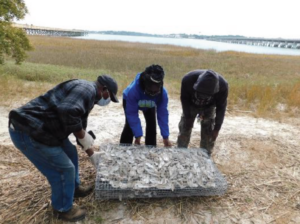
The economies and cultures that rely upon healthy coastal waters are being threatened by growing levels of pollution coming from the effects of particular forms of development and the increase in impermeable surfaces that allow pollutants to run off into the sea. A study of sediment samples from the ACE Basin in which the Salkehatchie watershed (Beaufort County) is located indicates levels of arsenic and other trace metals, pesticides, and PAHs that account for 73.5%, 16.1%, and 10.4%, respectively, of total cumulative risk (Scott et al. 1998). At the time of this study, the mean total cumulative risk estimate for all contaminants was less than 50% of cumulative levels of contamination projected to cause simple additive toxicity (Scott et al. 1998). The ACE Basin sediment contamination survey conducted by Scott et al. (1998) will serve as a baseline to measure the impact of subsequent anthropogenic activities (NOAA, 1998). Scott et al. 1998 suggested that increasing urbanization in Beaufort County would potentially increase levels of accumulated pollution in sediments (Scott et al. 1998). This project will examine the increased urban sprawl in Beaufort County and its potential health risks to the Gullah/Geechee population because they are “subsistence” users of the Salkehatchie watershed.
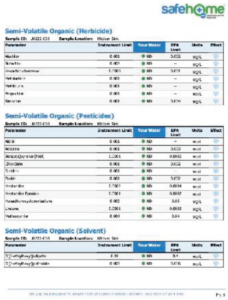 Queen Quet, Chieftess of the Gullah/Geechee Nation and Founder of the Gullah/Geechee Nation led several Gullah/Geechee community engagement activities focused on various aspects of water quality from drinking water to rivers and the ocean during 2022 and 2023. These activities afforded native Gullah/Geechees opportunities to engage with scientists from the US Environmental Protection Agency and the Gullah/Geechee Sustainability Think Tank. During the intergenerational engagements, Safe Home Drinking Water testing kits were distributed to participants so that they could leave the coastline and return home to test their water there. The kits returned 11 page reports to each participant and provided them with an easy to read fully detailed report about their drinking water supplies.
Queen Quet, Chieftess of the Gullah/Geechee Nation and Founder of the Gullah/Geechee Nation led several Gullah/Geechee community engagement activities focused on various aspects of water quality from drinking water to rivers and the ocean during 2022 and 2023. These activities afforded native Gullah/Geechees opportunities to engage with scientists from the US Environmental Protection Agency and the Gullah/Geechee Sustainability Think Tank. During the intergenerational engagements, Safe Home Drinking Water testing kits were distributed to participants so that they could leave the coastline and return home to test their water there. The kits returned 11 page reports to each participant and provided them with an easy to read fully detailed report about their drinking water supplies.
Since some reports remain outstanding, the total aggregate findings have not been amassed. There is a great deal of interest from the Gullah/Geechee community in receiving more testing kits and to participating in additional community engagement sessions. Therefore, a request was submitted to and approved by Thriving Earth Exchange for additional support for an engagement session in April 2022.
Due to the fact that the Gullah/Geechee Saving Environmental Actions & Marine Environment (SEA & ME) Program of the Gullah/Geechee Sea Island Coalition is an on-going program that focuses on insuring environmental health and safety especially as it relates to water quality, estuaries and fisheries, the QAPP Training provided by the EPA is being incorporated into that program. This will allow native Gullah/Geechees to consistently engage in citizens science and assist with stewardship of the waterways by providing immediate on-site information to the EPA to monitor and assess waterways that are reported to them and verify any potential pollutants that are of concern.
The Gullah/Geechee Water Quality Project participants are continuing to engage in coastal resiliency
projects ranging from the “Gullah/Geechee Living Landscape” project (https://www.epa.gov/newsreleases/epa-provide-building-blocks-assistance-saint-helena-island-and-beaufortcounty-south) which is assisting with living shorelines to the South Atlantic Salt Marsh Initiative (SASMI)-Marsh Forward to restore and protect 1 million acres of salt marsh in the southeast (https://www.pewtrusts.org/en/research-and-analysis/articles/2021/07/12/african-descendantshave-stake-in-saving-us-southeast-salt-marshes). Both if these new initiatives will provide ways to restore oyster beds and salt marsh which cleanse the waters of the Sea Islands on a daily basis. This will help sustain the fisheries and thereby assist with the continuation of Gullah/Geechee subsistence, sustainability and cultural continuation.
Due to the outstanding leadership in engaging the Gullah/Geechee Nation in this type of critical public and
environmental health work, Queen Quet who led the Gullah/Geechee Water Quality project was recently
honored with the Community Star Award by the US EPA and SC Department of Health and Environmental Control (DHEC):https://gullahgeecheenation.com/2022/02/24/queen-quet-of-de-gullah-geechee-receivescommunity-star-award-from-epa-and-dhec/
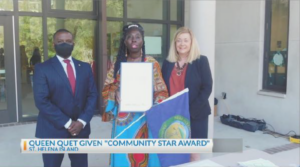
Not only will the sands or earth of the Sea Islands continue to thrive, but so shall the waterways and the
Gullah/Geechee community as a result of the empowerment that was provided via the Gullah/Geechee
Water Quality project and all the outstanding knowledge that was exchanged through it.
 Queen Quet was selected, elected, and enstooled by her people to be the first Queen Mother, “head pun de bodee,” an official spokesperson for the Gullah/Geechee Nation. As a result, she is respectfully referred to as “Queen Quet, Chieftess and Head-of-State for the Gullah/Geechee Nation.” Queen Quet is a published author, computer scientist, lecturer, mathematician, historian, columnist, preservationist, environmental justice advocate, environmentalist, film consultant, and “The Art-ivist.” She is the founder of the premier advocacy organization for the continuation of Gullah/Geechee culture, the Gullah/Geechee Sea Island Coalition. Read more about Queen Quet here.
Queen Quet was selected, elected, and enstooled by her people to be the first Queen Mother, “head pun de bodee,” an official spokesperson for the Gullah/Geechee Nation. As a result, she is respectfully referred to as “Queen Quet, Chieftess and Head-of-State for the Gullah/Geechee Nation.” Queen Quet is a published author, computer scientist, lecturer, mathematician, historian, columnist, preservationist, environmental justice advocate, environmentalist, film consultant, and “The Art-ivist.” She is the founder of the premier advocacy organization for the continuation of Gullah/Geechee culture, the Gullah/Geechee Sea Island Coalition. Read more about Queen Quet here.
 Tiffany Mouzon is Program Coordinator for the Marshall-Motley Scholars Program at NAACP Legal Defense and Educational Fund, Inc (“LDF”). Tiffany received her law degree from the University of the District of Columbia: David A. Clarke School of Law, and a B.A. in Economics from Emory University School of Law. During law school, she was an Equal Justice Rights Summer Fellow and a founding member of the Black Men’s Law Society. Between college and law school, Tiffany served in Suriname, South America with the Peace Corps, worked as a legal support professional, and nonprofit operational administrator. Prior to joining Cadence Counsel and Bridgeline Solutions, she worked as a nonprofit/community organizations consultant. In her free time, Tiffany enjoys spending time with her family and friends, and working in her community as a racial justice and disability rights advocate. She is a native Gullah/Geechee and an active member of the Gullah/Geechee Nation and the Gullah/Geechee Sustainability Think Tank.
Tiffany Mouzon is Program Coordinator for the Marshall-Motley Scholars Program at NAACP Legal Defense and Educational Fund, Inc (“LDF”). Tiffany received her law degree from the University of the District of Columbia: David A. Clarke School of Law, and a B.A. in Economics from Emory University School of Law. During law school, she was an Equal Justice Rights Summer Fellow and a founding member of the Black Men’s Law Society. Between college and law school, Tiffany served in Suriname, South America with the Peace Corps, worked as a legal support professional, and nonprofit operational administrator. Prior to joining Cadence Counsel and Bridgeline Solutions, she worked as a nonprofit/community organizations consultant. In her free time, Tiffany enjoys spending time with her family and friends, and working in her community as a racial justice and disability rights advocate. She is a native Gullah/Geechee and an active member of the Gullah/Geechee Nation and the Gullah/Geechee Sustainability Think Tank.
This project is supported by funding from the Gordon and Betty Moore Foundation.

(c) 2024 Thriving Earth Exchange